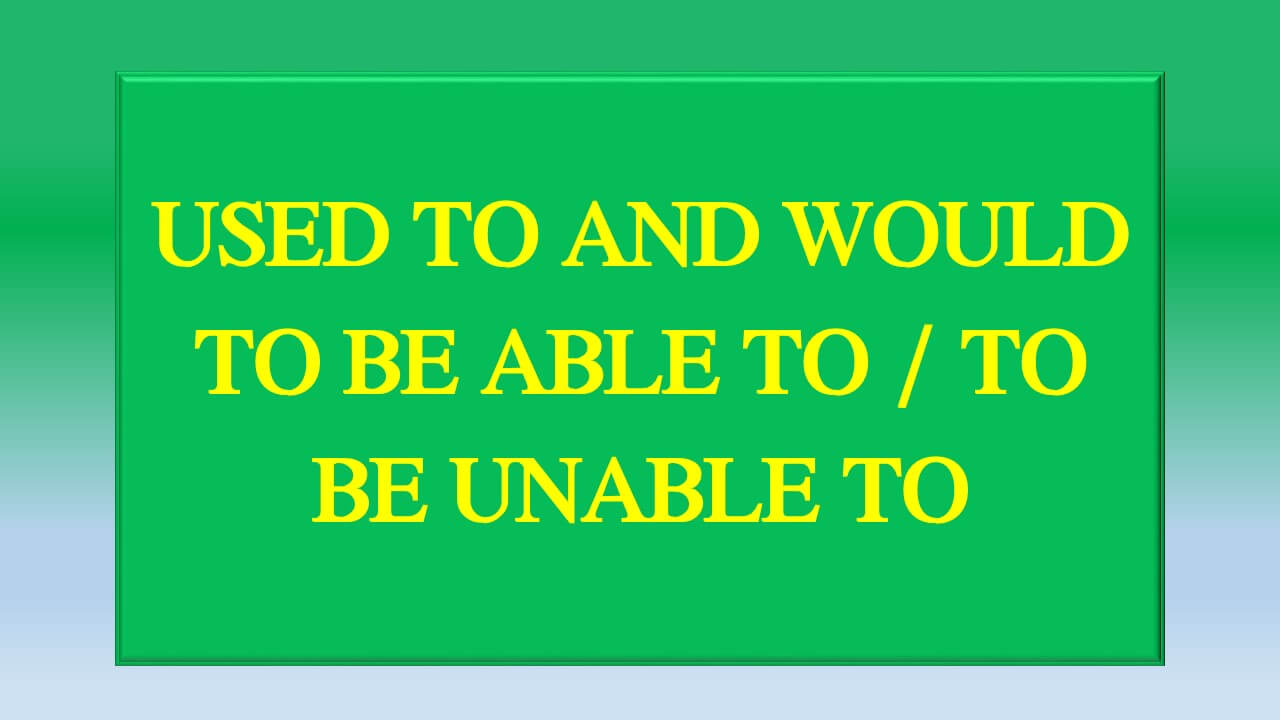Table of Contents
USED TO AND WOULD TO BE ABLE TO / TO BE UNABLE TO
USED TO AND WOULD
1) Used to:
सवयीच्या गोष्टी वारंवार घडणाया क्रिया व्यक्त करण्यासाठी Used to चा वापर
करतात. भूतकाळात एखादी क्रिया नियमितपणे किंवा वारंवार घडत होती, हे
दाखवण्यासाठी Habitual past tense चा वापर करतात. Habitual past
tenseव्यक्त करण्यासाठी Used to हे साहाय्यकारी क्रियापद वापरतात.
ex. Sachin Tendulkar would play cricket in those dyas.
(used’used to’)
Ans: Sachin Tendulkar used to play criket in those days.
-Learn this
1) used सोबत to चा वापर केल्याशिवाय रीती भूतकाळात बोध होत नाही.
2) used to नंतर क्रियापदाचे पहिले रूप वापरतात त्यामुळे मुख्य क्रियापद हे येथे
नेहमी infintive च्या रूपातच वापरले जाते
3) used to पूर्वी never चा वापर केला असता नकारार्थी वाक्य तयार होते.
4) used to हे भूतकाळी साहाय्यकारी क्रियापद आहे त्याची निरनिराळी रूपे होत
नाहीत.
5) used to हे एक modal auxilariy असल्यामुळे त्याचा स्वतंत्र वापर केला
जात नाही.
6) used to चा वापर करताना तयावर कर्त्याचे बंधन नाही. सर्व कांबरोबर त्याचा
वापर करतात.
7) used to चा वापर भूतकाळातील discontinued habit दर्शविण्यासाठी
करतात.
8) used to चे नकारार्थी रूप : didn’tuse/never used to
9) used to चे प्रश्नार्थक रूप : did…….use to………?
ex. 1) He would get up before dawn.
Ans: He used to get up before dawn.
2) He would sit near my shop.
Ans: He used to sit near my shop.
3) The doctor would give an extra half hour.
Ans: The doctor used to give an extra half hour.
4) Years ago my mother drove a scooter but now she
has acar.
Ans: Years ago my mother used to drive a scooter but now she
has a car.
USED TO AND WOULD TO BE ABLE TO / TO BE UNABLE TO
2) Would:
about things that were always true in the past.
ex.
we use’would’to talk about characteristic behavior or habits or
Flying used to start early morning. (use ‘would’)
Ans: Flying would start early morning.
Ex. i) We used to try to adjust the timings for him.
Ans: We would try to adjust the timing for him.
ii) He used to wait his turn like everybody else.
Ans: He would wait his turn like everybody else.
iii) He used to address us as ‘sir’.
Ans: He would address us as ‘sir’.
iv) Every morning my mother used to get up before sunrise.
Ans: Every morning my mother would get up before sunrise
III) Rewrite the folliwng sentences replacing ‘used to’with
would’and vice-versa: [‘used to’z urft would 31 for
‘would’ च्या जागी ‘used to’ वापरा.
1) My father used to get transferred every year.
2) My mother would set up an establishment.
3) Our day used to start with the family hudding around
my mother’s chulla.
4) Father would ask us to read aloud the editorial page.
5) He would give a reply.
6) She would take her kitchen utensils.
7) I would daydream about catching a spy.
8) I used walk to his office on normal days.
USED TO AND WOULD TO BE ABLE TO / TO BE UNABLE TO
TO BE ABLE TO / TO BE UNABLE TO
Earthquakes can occur almost anywhere. (use’able to)
Ans: Earthquakes are able to occur almost anywhere.
Learn this:
1) can किंवा could काढून to be able to चा वापर करतात.
.
a) can = to be able to
=am able to/is able to/are bale to
b) could=to be able to
=was able to/were able to
2) नकारार्थी वाक्यात can’t किंवा couldn’t काढून to be unable to चा
वापर करतात. .
a) can’t=to be unable to
=am unable to/is unable to/ are unable to
b) couldn’t=to be unable to
=was unable to /were unable to
3) can हे वर्तमानकाळी रूप आहे म्हणून can ऐवजी to be able to चा वापर
करताना to be काढून am/is/are यापैकी कानुसार योग्य ते रूप वापरतात.
iv) could हे भूतकाळी रूप आहे म्हणून could ऐवजी to be able to चा वापर
करताना to be काढून was/ were यापैकी कर्त्यानुसार योग्य ते रूप
वापरतात.
USED TO AND WOULD TO BE ABLE TO / TO BE UNABLE TO
For Practice
Use able/unable to
1. I can’t do this.
2. He couldn’t solve that sum.
3. The people can watch the cricket match at home.
4. My father can give me a gift.
5. He could get the new idea.
6. The crowd could hoot the person.
Use can/could
1. He was able to meet me.
2. Bhola was unable to utter a word.
3. Saniya was not able to win any medal.
4. They were not able to harm the culprit.
